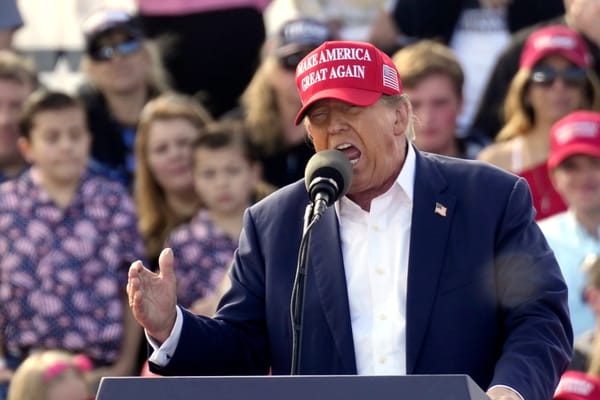During a rally on Saturday in Dayton, Ohio, Donald Trump said that there would be a “bloodbath” if he wasn’t re-elected. Menacing headlines spread across mainstream publications, leaving the impression that Trump was threatening violence if he lost. The Biden campaign accused him of issuing “threats of political violence.”
In fact, as many people pointed out on social media, the “bloodbath” comment came in the midst of a discussion of US trade policy. “Mexico has taken over a period of 30 years, 34 percent of the automobile-manufacturing business in our country,” Trump observed, before going on to warn that China was attempting to circumvent trade restrictions by building auto plants in Mexico.
“We’re going to put a 100 percent tariff on every single car that comes across the line,” Trump said, “and you’re not going to be able to sell those cars—if I get elected. Now, if I don’t get elected, it’s going to be a bloodbath for the whole—that's gonna be the least of it. It’s going to be a bloodbath for the country. That will be the least of it. But they’re not going to sell those cars.”
“Trump’s warnings echo those of the Alliance for American Manufacturing.”
Trump’s warnings echo those of the Alliance for American Manufacturing. In February, the trade group warned that Chinese companies exploiting Mexico’s trade relationship with the US could be “an extinction-level event for the US auto industry.” If not met with countermeasures, Chinese policy would end up “annihilating auto manufacturers in America.” In short, the group—a joint project of manufacturers and the United Steelworkers union—warned of a bloodbath.
Republican politicians are responding to these concerns. Sen. Josh Hawley has introduced a bill that would impose a 100 percent tariff on automobiles built in China. The bill would also close the “Mexico loophole.” The proposal, of course, has been criticized by free-market advocates. One need not be a thoroughgoing protectionist to think that the national security of the United States, and thus its future prosperity, depend on the maintenance of a robust manufacturing sector.
Among other things, this controversy shows the importance of Trump making the right vice-presidential pick. He will need an ally who is ready and able to push back against distortions in the media, while also fully supporting Trump’s agenda on trade, immigration, and foreign policy. Many people are encouraging the campaign to select a woman or minority, but demographic considerations are less important than finding someone who fully supports and ably defends the distinctive elements of Trump’s agenda. Most of the candidates are conventional conservatives who would like to see Trump’s agenda watered down, but there is at least one committed and capable populist on his shortlist: That would be J.D. Vance of Ohio, who was there at the rally and quick to shoot down the media smears about the “bloodbath” remark.
